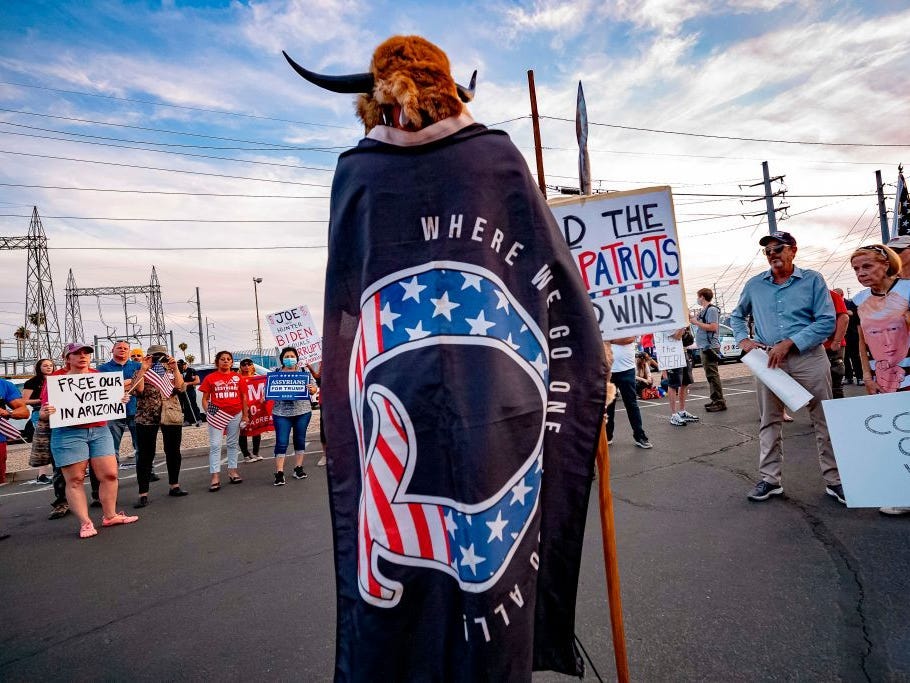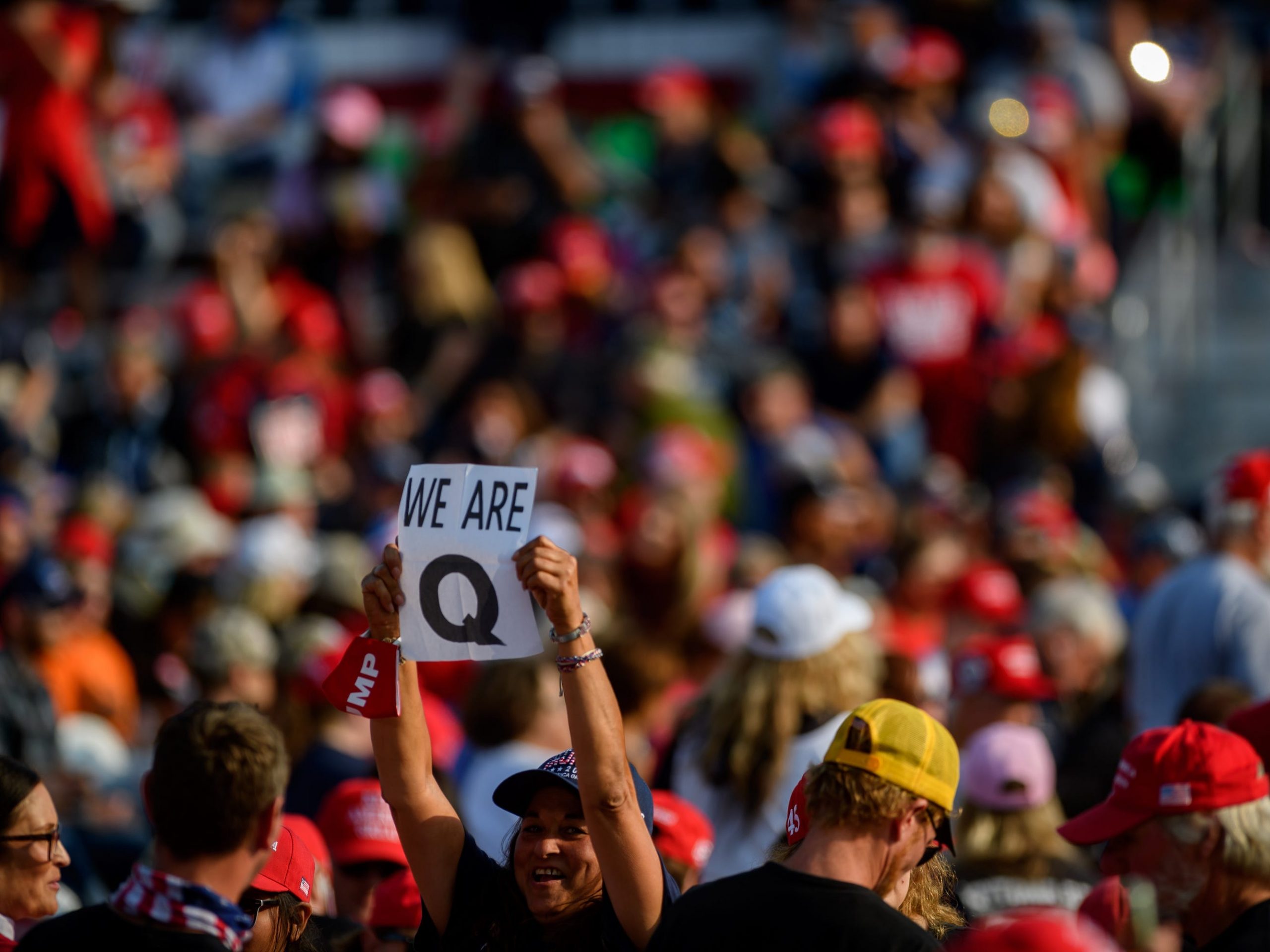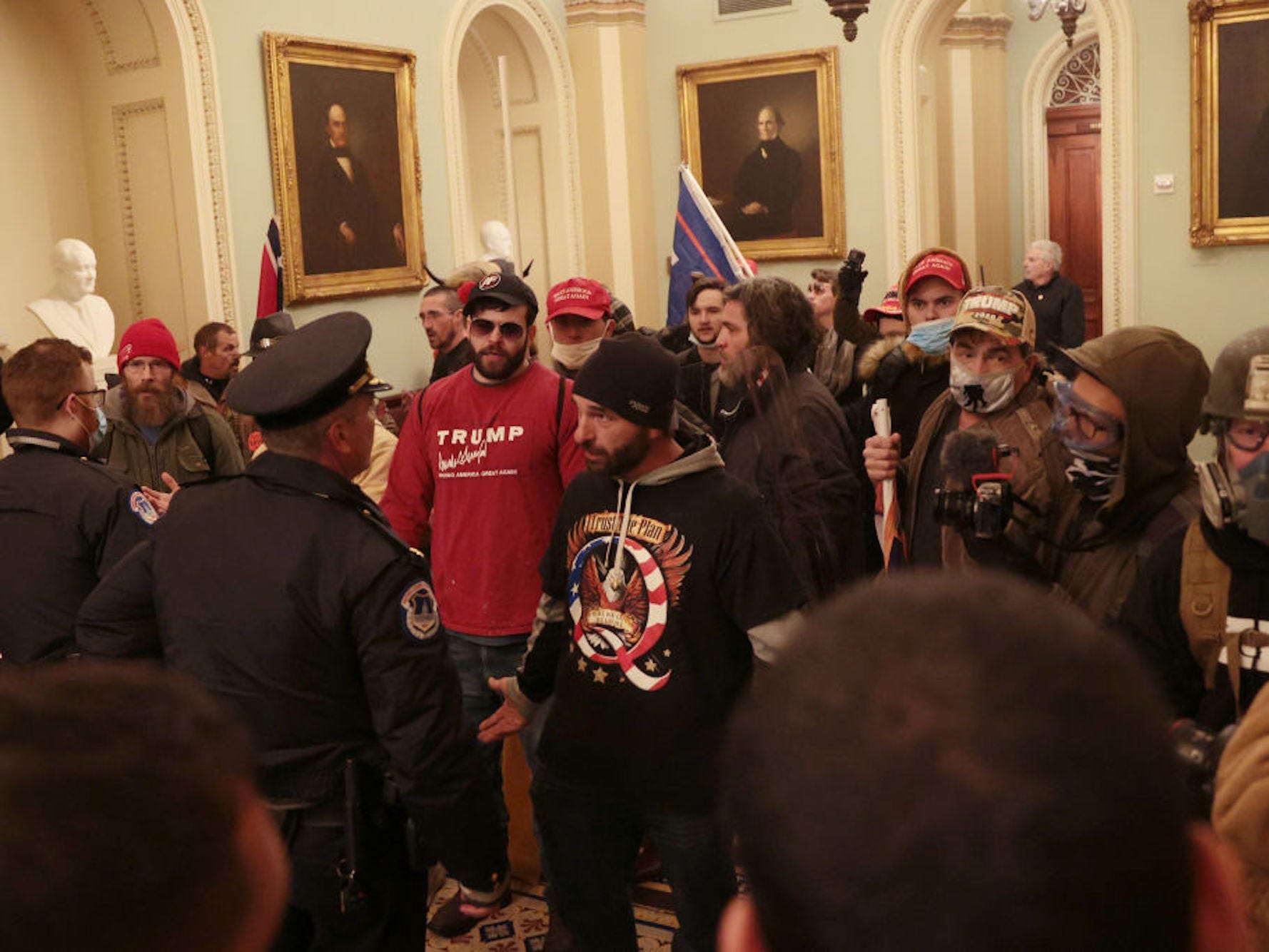
Olivier Touron/AFP via Getty Images
- Many QAnon believers realized Wednesday that with Biden in office, their conspiracy theory was a “big lie.”
- Even Ron Watkins, a powerful QAnon influencer, told followers it was time to “go back to our lives.”
- The stunning realizations came after QAnon’s popularity boomed in 2020.
- Visit Insider’s homepage for more stories.
One hour after President Joe Biden was inaugurated in Washington, DC, on Wednesday, QAnon conspiracy-theory chatrooms had an overwhelming – albeit, very familiar – sense of hopelessness.
“What are we waiting for now?” said one comment in a QAnon Telegram channel. “Is anyone still holding the line?” said another.
“So, was Q just one big lie and psyop that I foolishly followed and believed for over 3 years?” another user questioned.
In a QAnon message board, the discussion was similarly bleak: “Guys and gals, I’m losing my everloving mind right now. Is this really happening? Was this part of the plan?”
Wednesday was the final chance at redemption for QAnon, a baseless far-right conspiracy theory alleging former President Donald Trump was fighting a “deep state” cabal of pedophiles and human traffickers.
Finally, believers of QAnon appeared to realize that with Biden inaugurated, Trump's rule, and the fantasy they'd created around it, had come to a bitter end.

Jabin Botsford/The Washington Post via Getty Images
QAnon influencer Ron Watkins appeared to throw in the towel
QAnon influencer Ron Watkins, who had for years facilitated the spread of QAnon, echoed sentiments of resignation elsewhere in the QAnon movement.
Watkins is the former administrator of 8kun (formerly 8chan), the fringe message board where "Q," the anonymous leader of QAnon, posts cryptic messages. After two months of fighting to overturn President Biden's election win via claims of voter fraud on One America News Network (OAN) he finally gave up.
"We gave it our all. Now we need to keep our chins up and go back to our lives as best we are able," Watkins shared on Telegram with his more than 120,000 followers. "We have a new president sworn in and it is our responsibility as citizens to respect the Constitution regardless of whether or not we agree with the specifics or details regarding officials who are sworn in."
Read More: The QAnon conspiracy theory and a stew of misinformation fueled the insurrection at the Capitol
Extremism researchers have questioned whether Watkins was somehow associated with "Q," along with his father, Jim, who owns 8kun. The younger Watkins had in many ways become the de facto leader of QAnon, as "Q" has not posted on 8kun since December 8.
Many believers of QAnon had anticipated that Biden would be arrested at his inauguration, or that Trump would do something, anything at all, to prevent his successor from taking office.
But in the end, Trump said goodbye, danced to the "Y.M.C.A.," flew to Florida, and Biden became president.
QAnon has become increasingly popular in the last year

The conspiracy theory, which began on fringe message boards, originated in 2017 when an anonymous figure calling himself "Q Clearance Patriot" claimed to have high-level government security clearance, and that Hillary Clinton would soon be arrested for alleged involvement in a child-trafficking ring. The message on 4chan was noticed and spread by three far-right activists, as NBC News reported in 2018.
Clinton, of course, was never arrested. But the allegation that Democrats and elite, powerful figures were involved in human trafficking - which eventually extended to Chrissy Teigen and Oprah Winfrey - has been central to what experts call the "big tent" conspiracy theory, which can adapt and change as needed.
While it's difficult to track the specific number of people who believe in a conspiracy theory like QAnon, Facebook documents obtained by NBC News in August showed that there were millions of users in QAnon groups.
In 2020, the movement migrated from the fringes of the internet into more mainstream social-media platforms, and became hugely popular thanks to its association with COVID-19 misinformation and anti-human trafficking sentiment.

REUTERS/Stephanie Keith
Suddenly, beginning last spring, QAnon was everywhere. Elements of the theory even began spreading from lifestyle and parenting influencers on Instagram; Georgia Rep. Marjorie Taylor Greene was elected to Congress after previously espousing QAnon beliefs; Cable news networks were congratulating the theory's discoveries; and even the president of the United States flattered believers.
Data published on Twitter in July by Marc-André Argentino, a PhD candidate at Concordia University researching extremism, showed that of 74.2 million Facebook interactions in QAnon groups since the conspiracy theory's inception, nearly 50 million of those interactions took place between March and July 2020.
With the "Stop the Steal" campaign, which alleged that Trump had actually beaten Biden in the election, QAnon had another boost, as the movement was able to shift its focus to a new charge. Many QAnon believers, including the now-infamous "QAnon Shaman" or "Q Shaman" Jake Angeli, participated in the pro-Trump coup attempt at the US Capitol on January 6.
Some sects of QAnon believers aren't ready to give up yet

Win McNamee/Getty Images
Whether QAnon believers would simply shift their expectations and keep faith in something so clearly faithless in the wake of Biden's inauguration has for months been top of mind for researchers. In November, after Biden won the election, Joan Donovan, the research director of the Shorenstein Center on Media, Politics and Public Policy at Harvard University, told Insider in an interview that the movement would be able to survive post-Trump.
"It's able to incorporate breaking news events into its own storyline, so no matter what happens to Trump, the theory will adapt and the network will shift," Donovan said of QAnon.
Despite the sense of sadness for most, some of the movement's top influencers did continue encouraging believers to stay focused on Wednesday. Praying Medic, who has been a key figure in spreading the beliefs of the conspiracy theory, highlighted for his 89,000 Gab followers on Wednesday morning that Trump said he hoped this would not be a "long-term goodbye," indicating some hope for the future.
Praying Medic also shared on his Gab account a theory popular in online QAnon chat rooms, that the 17 American flags behind Trump during his final pre-inauguration address were sending a message of some kind, as Q is the 17th letter of the alphabet.
A Telegram user in a smaller QAnon channel with roughly 6,000 subscribers told fellow believers: "If you want to give up now, you know where the door is. I wouldn't blame you at this point, but I'm standing strong in my faith in God, and in Trump and the team." That message was shared in a larger QAnon group with around 10,900 members.
Connecting belief in the conspiracy theory to Christianity has become huge for the QAnon crowd. Lin Wood, the QAnon-believing attorney who attempted to help Trump's legal battles fighting the election results, shared a bible passage with his 524,000 Telegram subscribers: "(For we walk by faith, not by sight.)"
That notion of walking by "faith," rather than "sight," was made clear in a QAnon chatroom on Wednesday afternoon, where moderators warned users that they'd be banning anyone for sharing negative posts. "this IS NOT over," the moderator wrote, "HAVE patience."
